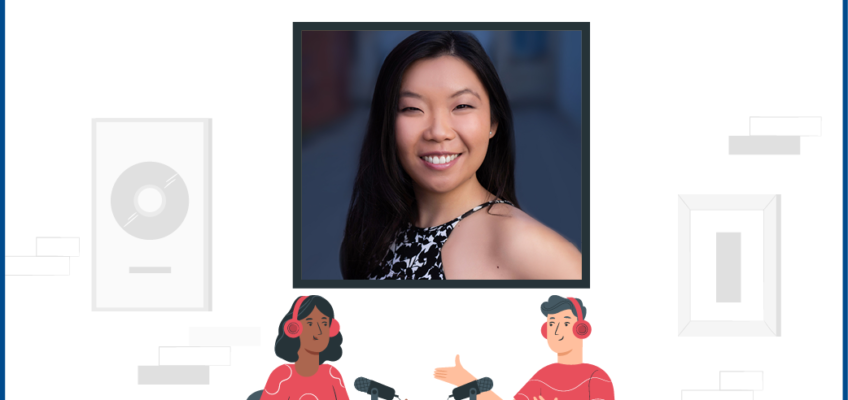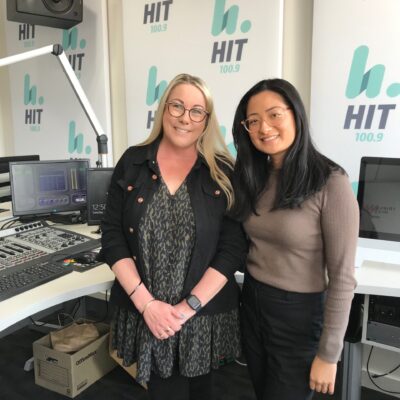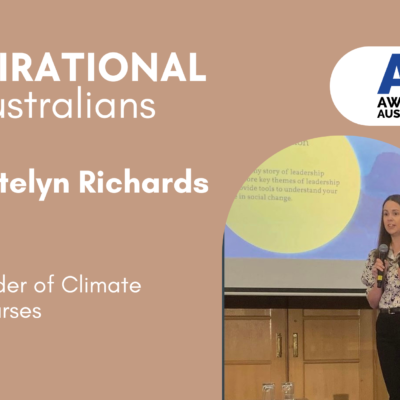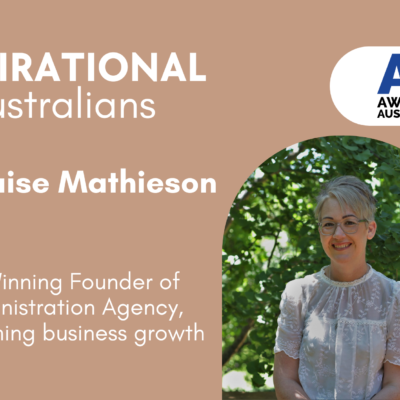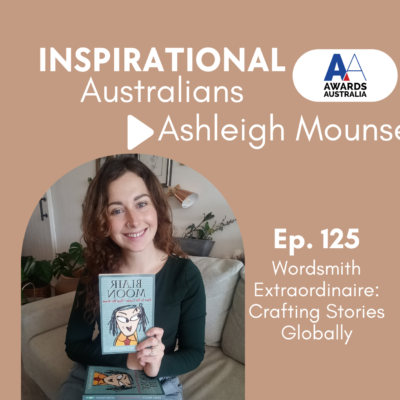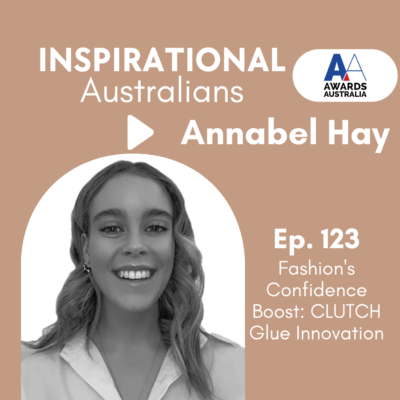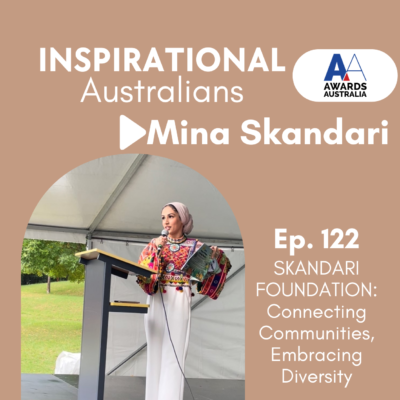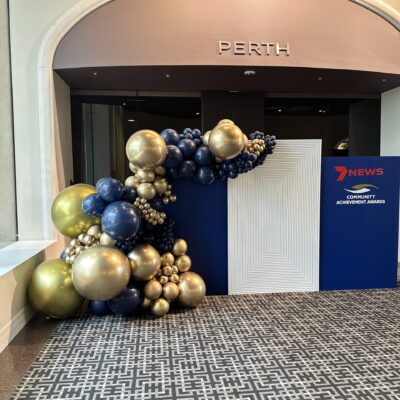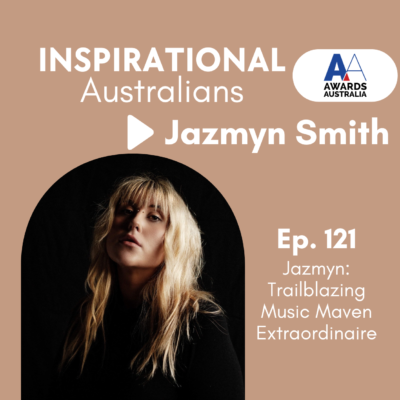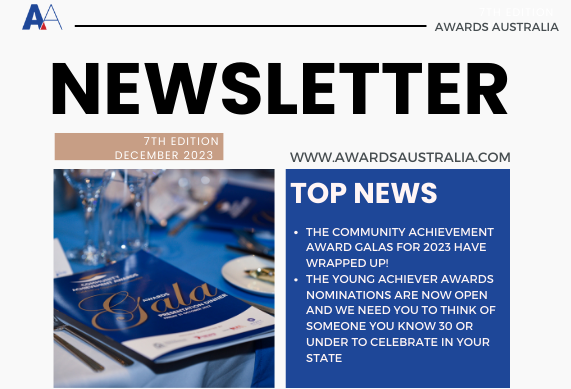In this week’s episode, Geoff is talking to Trudy Lin who was the Overall Winner in the 2021 7NEWS Young Achiever Awards for South Australia.
Dr Trudy Lin is one of only five registered specialists in Special Needs Dentistry in South Australia, providing oral healthcare to people affected by disability, psychiatric illnesses, and complex medical issues. A graduate of Bachelor of Dental Surgery, Trudy started working in the Special needs unit of the Adelaide Dental Hospital in 2016. She completed her Doctor of Clinical Dentistry in Special Needs Dentistry Program and an Advanced Diploma in Nutrition in 2020. During COVID-19, she self-funded the establishment of a Supported Independent Living facility for people with disability to live in the community. Trudy has an honorary title with University of Adelaide as a senior clinical lecturer. Trudy is heavily involved in volunteering for the community – including overseas dental aid and humanitarian aid through AHHA (Australian Health Humanitarian Aid), the Royal Flying Doctor’s Service (providing dental care for rural and remote communities in SA), Camp Quality (camps for kids and families who are battling cancer), and fundraising for the Cancer Council (105km ultramarathon on the Heysen trail) and Leukaemia foundation (World’s greatest shave).
In this episode:
- We hear how passionate Trudy is and how she goes above and beyond Dentistry for those in her care
- We learn about Trudy’s volunteering efforts both home and abroad
Links
Connect with Trudy on LinkedIn
Trudy is happy for you to email her at trudy.lin92@gmail.com if you want more information on any of the organisations she volunteers for or want to know more about Special Needs Dentistry.
Want to know how to Rate and Review a podcast, see this article
Follow us on our Inspirational.Australians Instagram Page
Want to nominate someone? (It can take as little as 2 minutes to recognise someone making a difference)
Like some more information on Corporate Partnership?
Transcript
00:00:05 Unknown :
Welcome to the inspirational australian’s podcast, where we check to people making a difference in their communities and in the lives of others. And here is your host for today. Jeff griffin. Welcome to the inspirational australian’s podcast stories of inspiring achievements and community contribution. Every week we will celebrate an award program category, winner or finalists. We hope you’ll be inspired and encouraged to know that australia is in good hands, together with our corporate partners and not for profit partners, awards, australia, showcase ordinary people from right across australia. Doing extraordinary things, if you enjoy hearing the stories about inspirational australians, please subscribe. Write us and review us. We really appreciate it. My guest today is an extraordinary young leader and community volunteer. trudy lin has a doctorate of clinical dentistry and special needs dentistry, and has an advanced diploma in nutrition and has very, very successful and rewarding career. Which is why she won quoin career achievement award. And she’s seven years young achiever awards. Why she went on to win the essay, young achiever, of the year as well, what unfolds during our chat and it’s certainly worth allison for a dose of inspiration. trudy, it’s such an honor to have you on the podcast today. Welcome to you. Thank you, jeff. I’m really excited to chat to you today. Thank you for this opportunity to shine a light on the very special people I look after in special needs dentistry. You’ve achieved so much already, which is so impressive. Congratulations. What made you down the path initially of dentistry? But people with special needs the first steps onto my path of special needs, dentistry, actually starts back in childhood. My dad has a condition called tetracyclines deigning, which affects all his teeth. So I grew up seeing firsthand the huge impact that oral health has on a person’s entire life. I saw how the ability to eat, to speak and smile affected, not only my dad’s physical well-being through his nutrition, but also his social and emotional well-being. So this led me to develop a passion for wanting to help people through oral health Care and set me onto the dentistry path. Then in my final year of dental school, I undertook a rotation in the special needs unit at the adelaide dental hospital where I had the opportunity to care for people with disability, with psychiatric conditions and people who have complex medical conditions such as cancer. My grandma and my grandpa have both fought their own cancer battles, and my youngest brother has autism. So mine and my family’s personal lived experience helped me empathize with the many challenges that my patients were facing outside of the oral health. And that showed me that this is where my dentistry could make the most impact and where my dentistry could make the most difference. That’s when I knew that this was the path i would walk for the rest of my career. And now I am fully set on that path working full time as a specialist in special needs dentistry. At the adelaide dental hospital, in that same special needs unit and alongside the same wonderful team where I was first inspired. Well, you certainly did it tough for your family and I can fully understand why you want to give back so readily and so much to people with special needs or power to you. And congratulations again for the impressive support you give to, to so many. How long did your studies actually take you to complete? It took a while. It was five years to complete my bachelor of dental surgery to become a general dentist. And then three years to complete my doctor of clinical dentistry, which is the specialty training. And I was very, very fortunate to be supported by the dental service to complete my specialist training while still continuing to work full time looking after special needs patients. In addition to the academic commitments of the course and my research thesis, it’s a massive part of your life eight years. But I’m sure, well, worthwhile for what you’re able to do now. And I know your research too was really impressive. Can you tell us a bit more about your specialist training? Yes, absolutely. implementing my research is actually currently one of my biggest passion projects. So I’d love to talk about it. My research has the aim of increasing access to oral health Care for people with special needs. When you think about how challenging it can be for many of us to attend even now, six monthly dental checkup, there may be financial barriers, lack of time due to competing work and family priorities. anxiety from previous negative childhood experiences. Now imagine how much harder it would be for a person with a disability to see a dentist. They face many barriers, many of them which are out of their control. For example, physically accessing a building without wheelchair ramps finding a caregiver to escort them and financial barriers due to being unable to find employment. But one of the most significant barriers is actually finding a dentist who is willing and equipped to provide care for them. I am only one of five special needs dentistry specialists in South australia and one of a little over 20 registered specialists in the whole country. And the bureau of statistics reports that one in every five australians is living with a disability. So this was the big reason behind my research to help address the access issue due to the severe undersupply, a specialist in Australia. So understanding that every person with disability is very unique and has their own individual needs. It means that they require the care of differently skilled dentists and specialists. Therefore, my research investigated using a complexity assessment tool to help identify patients who have different levels of needs, which would then enable us to refer them to a dentist which best suits that need. So across south australia we have a network of dentists who have been up skilled in their ability to provide care for people with special needs. And by implementing this tool, we can identify the patients whose needs would match the skills of these dentists. So they can access care close to home within their own community, as opposed to sitting on a very long specialist waiting list. And this would then allow the patients with the highest level of need on that waiting list to see the specialist sooner. So the goal i’m currently working towards is implementing this tool in the public oral health Care system in South australia and fingers crossed hopefully one day across the whole of australia. And this will help create a more inclusive society where every person has equal access to oral health Care. That is pretty impressive. That’s for sure, that is a unique and open to the incredible created creating. It sounds amazing. And again, it’s a tool that was developed in the United kingdom and is currently implemented in the public system over there and been quite successful. And so I use that as the premise for my research and showed how it was applicable to the australian health Care system. Fantastic. You’ve got a real passion to help people affected by disabilities, psychiatric illnesses, and complex medical issues for our health. In fact, it is still one that I believe the establishment of a supported independent living facility for people with disability to live in the community have come about and can you tell us more about it? Yes, this passion project actually comes back to the story of one of the patients i look after in the special needs unit. So it originated with one of my very dear patients who uses a wheelchair, due to losing function of his legs in a motor vehicle accident. The institution he was living in closed down. And he was left struggling to find a home because he couldn’t find a house which had wide enough doorways for his wheelchair to fit through. So his sister was actually building him a wheelchair accessible house from scratch out of her own pocket. And his sister’s love for her brother really stayed with me. And I still remember really clearly laying in bed that night and thinking what about the families that can’t afford to build a house? How are they going to find a place to live? And so that’s how this project will begin. It took a lot of research, lots and lots of research. And I engaged a huge number of different people. There was a massive team involved in the making of this facility builders, property specialists, carers, that work for the National disability insurance scheme. And by combining many different people’s areas of expertise. I managed to self fund and construct a residential facility that allows people to live in the community with the support of a carer to assist with household duties. That’s massive, not think our listeners are probably starting to understand the breadth of what you do and why you actually won the chamber of the year. And there’s never been a more worthy winner in my humble opinion. What impact kind of you get, what you do is kind and amazing and we just happen to have the privilege of being able to make other people aware of the important things that people like yourself do. But thank you truly what. So what do you hope that this residential facility project will achieve? Well, I’m thrilled with the outcome of creating this home for people with disabilities to live in. But I also hope that the impact of this project goes beyond that. To show people the significant impact that your words and your actions can have on the lives of others, such as that sister impacted me. I hope that my project will have its wider impact on our community and increase awareness of the importance of universally accessible building design, inaccessible building design is actually a really great example of how disability is created by the environment a person lives in, rather than the actual impairment itself, if a person with a disability lives in a universally accessible environment with ramps and wide doorways, then that person doesn’t face any limitations and their ability to live, to work and to play. So I find that it’s really wonderful to see the positive shift and progression in society’s views and understanding of disability from the outdated, previous medical model of disability. Which viewed the person’s impairment as a problem that needed to be fixed. placing the responsibility on the individual to overcome the barriers created by the environment to now progressing to the social model of disability. Which recognises that people are not disabled by the impairments, but by the world around them. That the problem lies with society not being accessible or inclusive. And so therefore we as a society can work together towards creating equal access and opportunities for people with disability to participate on an equal basis with others. And I personally truly believe in our society’s capability to work towards becoming more inclusive to people with disability. Because disability is something that connects us all and affects each one of our lives, either personally or through a loved one. So many of us will end up living with a disability at some point in our life. Any one of us could end up with a disability at any time. It could be temporarily through an injury or permanently through a car accident. And if we all live long enough, we will experience the physical disability that comes with age and chronic medical illness. If we don’t experience disability personally, we are actually all sisters, brothers, colleagues, friends, children, and grandchildren of people whose lives have been affected by disability. So disability is actually really unique in that way of an identity category, because all of us or our loved ones fit into it. And so with that understanding and the empathy that connects us all by starting conversations and changing the perceptions and attitudes of those around us, we can move forward in creating a society where people with disability can live and participate on an equal basis with other people. They beautifully said, and you make it sound very real when you talk about something as simple as having an injury. How that affects us and our lives very in a very real way. multiply that by the x factor to try and even vaguely understand how someone with the disability deals with life, if they’re not being adequately looked after or considered. And we have some very small inkling of what is still needed. And having said that, you are very passionate about raising awareness and supporting people with special needs. What else is still needed to be done? Well, there are many unmet needs for the special needs population. And we’ve talked about accessible housing, but also equal opportunities for employment is another important issue and also access to medical and oral health Care. But as I’m a specialist in special needs, dentistry, i have a strong focus on advocating for oral health Care needs. So the people are lucasta and special needs dentistry, including people with disability that have physical, intellectual, and psychiatric conditions as well as people who have complex medical conditions like cancer are at higher risk of developing our disease. For a huge number of reasons. It can be a direct result of their disability or condition itself, or indirectly through the side effects of the medications or the medical treatment they receive. But then also layering on top of that the additional barriers that they face to accessing our health Care, which was the reason behind my research. They can face a wide range of different challenges because of their condition, which includes difficulties finding employment which creates financial challenges that arise in finding suitable housing, being at risk of Social isolation. And all of these factors have a substantial impact on their own health. And then their own health can have a significant impact on the physical, social, and psychological well-being. So you can see how this creates this huge bidirectional impact. And on top of that, more research is bringing to light that all health Care is even more important than what people may have previously realized in 2019. A paper was published, investigating causes of premature death in people with disability in Australia. And it showed that aspiration pneumonia was the most common cause of respiratory death aspiration pneumonia can be caused by the inhalation of dental plaque into a person’s lungs. So this means that elderly people and people who have disability with swallowing difficulties are at higher risk of developing this. So now with that knowledge, educating a patient or a caregiver of the importance of daily toothbrushing takes on a whole new meaning. It’s not just about saving their teeth, it’s actually about potentially saving their life. And this is why I am so passionate about advocating and raising the awareness of the huge impacts that our health has. And very importantly, to sounds. You know, you don’t actually really think about it to be honest in the way that you’ve described it. So it’s a bit of an eye opener, or in this case, excuse the pun, a mouth opener. I love country, but we really need to be aware of the little things, even if it’s our loved ones, making sure they are cleaning the teeth properly. Saying that dentists and to know that there’s only five of you with your skills and experience across south australia is a bit scary. So I don’t know whether it becomes overwhelming for you sometimes to know how much needs to be done and how much work there still is for yourself and your colleagues. But it does sound a little scary to me. Well, we’re all working together towards the same goal of helping to reduce the access barriers for people with special needs, for example, through my research, but then also through educating and equipping the dentists that are coming through the undergraduate training. So that’s something that I am also working towards and the rest of my colleagues, one of the really great things about working in the special needs industry field is that because there’s so few of us, we are a really tight knit community of like minded individuals who contribute and try. Yeah, basically all want the same goal of trying to help people who are in need. And so that is a really wonderful community to be a part of. And I know a lot of my passion and encouragement to looking at the examples of people that have gone before me. Well, there’s a, there’s a good reference for your colleagues and if they’re anything like yourself, they must all be extraordinary. human, they are all extraordinary. The that is, that is so impressive, and I don’t think often enough we think about those professionals in the various fields of health that really makes such a contribution community. And it’s because of their very special personalities and desire to give that makes such an impact. Now not only have you contributed significantly to the australian special needs community, but you also volunteered overseas with dental wide and humanitarian aid through the australian health humanitarian aid. Can you tell us a little bit about that? Absolutely. australian health, humanitarian aid, or ahar for sure. It is a non-profit charity organisation which provides health Care and humanitarian services to overseas countries in need. And what’s really wonderful about this organisation is that not only does it bring together a group of compassionate health professionals, who volunteer their time and expertise to provide eye surgery, medical and dental care to the underprivileged populations overseas. They also focus on training and education of the local health professionals. And this is what really drew me to this organisation because this education and equipment of those professionals that work locally is what helps create sustainable positive impacts for that community which continues outside of us. visiting to do the volunteer trips. So I volunteered on a trip to cambodia and vietnam, where I cared for orphans who have disability, who may have never seen a dentist in their life before. Because of the stigma that’s associated with looking after people that have special needs and seeing with my own eyes the needs of the underserved population only further strengthened my conviction. That special needs dentistry was my path. And it was actually that same year that I went volunteering that I was accepted into my specialist training program this year. Yes, it was. I can’t tell you enough how inspired i am. By the moment I met you, of course, going back prior to that judging reading about your story and what you’ve done was very, very impressive, but you are an amazing human. So I care enough. So thank you for all that you do in the community and how inspiring people like yourself are for the broader community, including me. You’ve also been a passionate volunteer across multiple community activities. Can you tell us some of those other ones that you’ve been involved with? Yeah, sure, I would say that volunteering probably counts as one of my hobbies now. I spend a lot of time doing that. So in the dental field, i have volunteered for the royal flying doctor service, which is providing dental care for rural and remote communities in South australia, such as marla, mintabie and kununurra. And the people there were very grateful for the care that we could provide due to how isolated they are from places that have specialist services. So that was definitely a very rewarding experience in terms of outside of dentistry. I volunteer for camp quality who provide a whole range of help and services for kids who are facing cancer. And I’ve been involved in a number of the camps and family funding days. The last camp that volunteered on was two weeks ago and amazing to be a part of just to see the kids have the chance to be kids again, to be able to laugh and play, make friends, and try new experiences. What I love about camp quality is that they recognize the impact that the cancer has not only on the child, but also on the siblings and the parents. So at this camp, i volunteered on had the whole family come along for the experience. And the parents had the opportunity to enjoy a dinner together while as volunteers looked out to the kids. And this created the opportunity for them to connect with other parents who are facing similar challenges to them. And that is just so important to be able to connect to people that are facing those similar challenges. And I just cannot speak highly enough of the great work that camp quality does. And then I would say the next branch of my volunteering sits in the fundraising category. So I’ve participated in a number of fundraising endeavors such as the world’s greatest shave by shaving my head to raise money for the Leukemia foundation. And also being the time optimizer that I am, I found a way to combine my fundraising with one of my favorite hobbies travel running. And I raised over five thousand dollars for the cancer council by completing a hundred and five km ultramarathon on the horizon trail. Well, it’s massive. Yes. It is. Since that run i have driven to places which are over a hundred kilometers and to this day, I still don’t know how I did it. Well, I know a little bit about how I did it. I entered the race knowing that I would experience a world of physical pain, but during the painful moments i kept reminding myself of why I was doing it. I kept thinking of the resilience of my cancer patients who were going through something infinitely more challenging. And it just kept me putting one foot in front of the other. And as with anything that I’ve done with my life, I owe the achievement to all that supported me. My family, my friends, my colleagues and my patients who all supported me and gave me that strength to carry on. If I may just share the story of how I finish the race, i had a few family members. My uncle chang, my auntie tanya and my little cousin clinton, who had been tracking me all day and night during my race. And they saw that my pace really slowed when it got dark. So what they did was they drove out to the horizon trail and found me on the trail with less than 20 kilometers to go. And that gave me a surge of power, even though I was in so much pain at that point somehow. Then being there with me on the trail with me made me go faster and then with only five kilometres to go, the physical and mental exhaustion and the sleep deprivation was just really hitting me. And at that point, my uncle turned to me and he said, you know, if your grandma, who is the grandmother passed away from cancer, if she was still here, she would have been right here on the trail with you, holding a torch to light your way. And I once he said that, I just knew that I had to cross that finish line. So I overcame all that pain and somehow managed to sprint to the finish line. hearing the cheers of my family on the other side. So I guess it just goes to show that love and support can make you powerful beyond measure. And that’s one of the lessons that I learned from the resilient cancer patients. I look after. Yeah, to say that’s a beautiful story Of overcoming and thanks to your family, being there to support you, but I can’t begin to imagine the pain you must have felt after all the next day after that one hundred as well, but compared to for achieving that goal. That is massive and sounds like an amazing family. And the other thing I do as I, for my family, I just always there for me and I, I all my achievements to my family and the people that support me. I think we all realize that our high achievers would not be able to do without those people who support them and encourage them support physically, emotionally, as well. Know, it’s so so important. And that’s why I think bitcoin is such a critical thing that we can give that costs us nothing to say hello to someone that just may need that at that time can be critical. So absolutely a smile or a kind word. And I can’t quite get in my head how confronting it might be also to shave those long locks off and how that might help for you as well. So to me, that’s pretty brave as well. Oh, thank you. Well, actually I did that during my special needs unit rotation when I first started looking after cancer patients. And the reason why I wanted to do that, and this is one of the things I love about fundraising, is that the positive impact doesn’t just stop with the monetary amount raised. It’s also about the opportunity it creates to raise awareness and start conversations about causes that I care about. And one of the things that I experienced as a result of doing the world’s greatest shape was that I made the choice to sacrifice my hair. And it gave me that empathy and understanding of what my patients were going through. And it was only a glimpse because as hard as it was for me to make that decision, that is not a decision that my patients got to make. It’s not something that they chose, it’s something that happened to them and a challenge i need to overcome. And so me having that small insight into how difficult that would be. And that’s only one small, miniscule part of the entire journey, the entire cancer journey. That just was another thing that made me realize just how important it is to support the special needs population and do what we can to help meet that need. And a lot of little bits make a whole lot today. Yes, definitely. And you know, at times I’ve actually felt really moved and almost overwhelmed by just how generous people are and how willing they are to give to needed causes. Once that awareness is raised, so true, very true. And I believe you also give back as a senior clinical lecturer at the University of adelaide. So they happen to be long term supporters of the seven year olds as well. Can you tell us about your role there? Yes, I am. I hold the honorary title with the University of adelaide and I’m involved in giving lectures on special needs dentistry. For undergraduate students. The most recent lecture i gave was on oral health Care for people with disability to the Bachelor of oral health students. And it was so encouraging to see the engagement and the interest. And as I spoke about before, I believe one of the important ways that we can improve access to oral health Care for people with special needs is to educate, to equip and engage dentists early on in their undergraduate dental journeys. So that they have the confidence and the skills to look after people with special needs long after they graduate. The knowledge is so powerful. Yes, knowledge is power. Yes, I will open up to you. I mean that’s, that’s an important part of a part of anything is education? Yes. And just going back to the seven years, young achiever would call presentation ceremony which was in May of course and hosted by the amazing a million mccaig from seven news. And the weather presenter and all around amazing human. I do remember so clearly the beaming smile on your face throughout the night was absolutely amazing to become a finalist. came across to all in the room, all 400 covid kept audience members They were so thrilled just to be there to be a finalist was extraordinary winning the awards must have been such an incredible acknowledgment and validation of the work you’re doing. Yes, certainly it has been and I am so truly honored and humbled to be the recipient of the award. But really, as I’ve said before, it also belongs to all the wonderful people who have supported me day in and day out leading to that award. Why? You heard during my speech the toilet roll a long list of people that I thanked, but my family, my friends, my colleagues, but then also importantly my patients because they have really shaped who I am today. And after the award, it has really filled my motivation tank to the brim like adding fuel to my already burning fire. But the one thing I am most grateful about is the opportunities it has created like this podcast, to raise awareness of the needs of the special needs population i look after. So it’s just really wonderful and I thank you jeff and all the other team members in awards, australia for making those awards happen to allow these opportunities and to get people who have contributed to the community together in the same room and inspire each other to continue doing the good work they’re doing. So thank you, jeff, for your role in all of that. Our pleasure. And our purpose is to help people achieve their goals and to realize their dreams, whatever they may be, by raising awareness and giving that validation kudos and awareness for people like yourself. It’s so important, I think that we have and know that there are role models for us to follow and that young people are at the forefront of achieving greatness in our future. There are now and people like yourself really constantly and continually inspire me and hopefully the whole community and, and that’s why we do it. And we’re so privileged to have our sponsor partners who are doing these very, very tough times. And it is tough at the moment, continue to give, so that we are able to raise awareness of people like yourself and the important things that you’re working on, like people with special needs. Now nominations for our listeners for the seven years yanagihara awards are going to be open again soon. And if anybody would like to find out how to nominate someone or more about sponsor opportunities as well, please drop me an email at jeffie towards australia dot com. That’s the unusual spelling geocaches and awards. australia will head towards australia dot com, where you find more information about nominations and in each type. So what does drive you, what really motivates you to do what you do? What drives me is my why? I always start with my why, whenever I set myself a new goal, i start by figuring out the reason why it’s so important to me. Because inevitably there will be challenges that are faced along the way of any big project or big goal. And I use my y as my north star to help me moving forward. My grandma was the strongest person that I know. And she played a huge part in shaping the person I am today and why I do what I do today. She taught me that strength doesn’t come from what you do. It actually comes from overcoming what you once thought you couldn’t. And I think of her words really often. I think of the positive impact that she has left on me and all those who knew her. And that shows me how, even though she’s no longer physically here with us, how she continues to have such a positive impact. So I aspire to follow in her footsteps and leave my imprint on people and my little dent in the universe that will continue long after i’m no longer physically here. So I would say that is what that is something that really drives me is that example that my grandma said what your grandma, what was your grandma’s name? She sounds amazing. My grandmother’s name was t cell phone t cell phone. Well, t cell phone was clearly an amazing person. She’s taught you Well, and it’s all rubbed off. And I’m sure she’s looking down would be very proud of her . I did think of her a lot leading up to the awards ceremony and think about how hopefully how proud she would be to know I am in the field. I am today because of the example that she set for me. 100 percent no doubt. And I think, you know, you talked about not always getting things right, but without failure, success is rarely possible. So we have to be prepared to have a go and not worry about failing or what people think of us. Because without those learnings, it’s, it’s hard to become a better person or do things better than we’ve done them before. So, you know, I can agree with you more, but there must be times that you do so much when it all gets a little too much for you or you’re feeling a little low. As do we all, what’s your secret? What do you do to help reset bounce back or recharge? Yes, certainly that’s a really relevant question. And good question. Because one of the more challenging aspects of my job is that emotional weight that comes with caring for my patients who face so many challenges with their oral health and outside of the oral health. And because of that special relationship and the bond that we develop. often my mind long after i’ve left the dental surgery is just filled with thoughts and empathy for the hardship my patients are enduring or grief from the passing of a patient. So I do have a number of recharge strategies to help keep me on my path. So I’m very fortunate to be surrounded by a wonderfully supportive team at the special needs unit, and have a really good network of Family and friends, which definitely helps get me through the tough days. I also practice gratitude on a daily basis and try to focus on the positive impact so I can make and how every experience, every interaction. Every thing that happens good or bad are all helping me grow into a better person and a better clinician to be able to help others who are facing similar hardships. And one of my other really big resilient strategies is practicing mindfulness and the most effective way that I have personally found to do this is through intensive physical activity. Because exercise is also something that’s really good for emotional and psychological well-being and good for your physical health too. So my favorite one at the moment being outdoor rock climbing, and rock climbing is something that’s particularly effective at bringing me to the present moment. Because I have a fear of heights. So rock climbing really forces me to use all my focus and bring my mind to the present moment. My thoughts have to be singularly focused on my next move and not falling because I’m so deathly afraid of heights. Well, that’s facing your fears head on. That’s for sure. Yes. So many little gems there for our listeners. I really feel for doctors counselors, health Care workers, because I get so much emotionally attached and it must be very, very difficult. I just suggested to separate myself from that and not think about these beautiful people. You can only help so much. Yeah. So help out to that. Maybe. Yes, it has definitely been a good learning experience to figure out how to untangle from the intertwining of the lives of the patients and the people we really care about. But as I said, I’m really lucky to have people that have helped me along the way. And just over time, more and more experiences, teach you to become that more resilient person. And my patients are a really good example of how to become resilient. So I learn a lot from them. Yeah, good for you and I think it’s really important for everybody to find someone they can talk to. They can confide in or just Pick up the phone rather than the text message or the social media platform. And just have a chat, not necessarily about anything, but yeah, I think we will lose a lot of that these days with social media emails and so on that personal contact. So what is next for dr.? Trey, lynn. What’s next? I’ve gotten that question a lot. Actually recently I would say my next big thing will be working on implementing the complexity assessment tool in the public Health Care system, firstly in South australia, and then next in the rest of australia, that would be my major goal. Because I have a vision for the future where I hope that every person can have equal access to all health Care. In terms of outside of dentistry. I have a goal of fundraising for my next iron woman triathlon. And so that incorporates a three point nine kilometre swim hundred and eighty kilometre, bike ride and a full marathon. So forty two point two K run and I’m planning to fundraise for the great work of camp quality. Fantastic. So do you do that triathlon across what? Three months or, Well, it’s been fun sitting on one standing. Well, you are a woman of many talents and maybe a sucker for punishment as well. Maybe a little bit. Yes. considering how many years of study that I did. Yeah, well, I think adding a fundraising component to it, you know, speaks volumes for you. So opportunites to massive girls coming up, so that’ll keep you pretty busy. I’m sure. Yes, certainly if you’re a marathon, not you go to the triathlon when that’s coming up. So I’m plan for the one woman to be next year. And one of my many goals on the way to that big goal is to complete a half. I am woman in November. That sounds a good idea. Yes, I have a tendency to create big goals and then set mini goals along the way. So the half iron man or woman is the half of everything that I just described. Which yes, if I can do that, then I’ll be well on my way, hopefully to be able to complete the entire thing that only two weeks per leg apperception, not three months age If you chat with me today has been full of wisdom. But are there any other words of wisdom that you would like to share encouragement or wisdom for our listeners? Oh, that’s very kind of you to say, jeff. I would say, i’d like to reiterate what you said earlier about the impact of kind words and actions on those around you. I really believe that the way towards creating a more inclusive society is through empathy, through understanding people better and sharing that understanding with others. To help break down those stigmas, and attitudinal barriers that we see in society. So it’s someone that you know has cancer or a disability support them in the ways that you can recognize the impact that your word and your kind actions can have on a person. Start conversations about universal building design, about how society can play a role in reducing barriers that people with disabilities face. As we know, it’s an important topic that affects all of us. And also realize that you can positively impact people through the example that you set as like how my patients have led by example for me. Absolutely. I was driving along and stopped at a traffic light the other day. And there was a lady who was clearly blind, the white kind of lights, and I thought to myself, I am so inspired by her and blind people who have so much courage to go out not being able to see or having very, very minor side people with a disability in general, what they have to face, and the I guess the discrimination to a large degree still, that they have to face as well. You just think how brave strong, powerful, and what inspiration they are. So we’ve all got so much more to do to, to help people that, that need our support as you’ve talked about today. Yes, absolutely. I mean, that’s one of the reasons why I love my job so much. I have the privilege of being able to connect with and care for so many different, unique and incredible individuals and to have the opportunity to make a positive impact on their life through the oral health is just such a privilege. I learned so much from my patients who demonstrate such strength of character in the face of the many challenges that they encounter on a daily basis. And that’s how they have affected me and shaped who I am today. And I aspire to be a more resilient and compassionate and grateful person because of that incredible example that they set day after day. beautifully said, well truly, where can our listeners connect with you online or find out more about your work? I would say the best place to connect with me is through linkedin. More than happy for people to drop me a line or a message. Well, truly, it’s been an absolute pleasure to have you on the podcast today. You’re a real inspiration. You’re a powerhouse. You’re a motivator. You’re full of wisdom. Thank you so much for sharing some of your story today. Thank you for this opportunity to talk about the special population that I look after. It’s been really wonderful chatting to you. Well, thank you. I hope everybody really enjoyed hearing some of trute story today and until next week, please remember being calm really makes a difference. I hope you enjoyed today’s interview as much as I have. We would love you to subscribe to our podcast, that you won’t miss an episode showing us each week as we talk with ordinary australians, achieving extraordinary things. Did you know that awards australia is a family owned business that proudly makes a difference in the lives of those that make a difference for others? And we thank our corporate not for profit partners to making award programs possible to, you know, someone that’s making a difference. Or maybe your business might like to sponsor an award. Contact us through our instagram page, inspirational dot australians, head to our website, awards australia dot com. Would be great if you could share this site with your network. Because who doesn’t like a good news story, and please write and review us. We would really love to hear your thoughts until next week. Stay safe and remember together we make a difference. Thanks for joining us today on the inspirational australian’s podcast . We hope you enjoyed listening and have been inspired by ordinary australians achieving extraordinary things. So it’s goodbye for another week. Remember together we make a difference.


